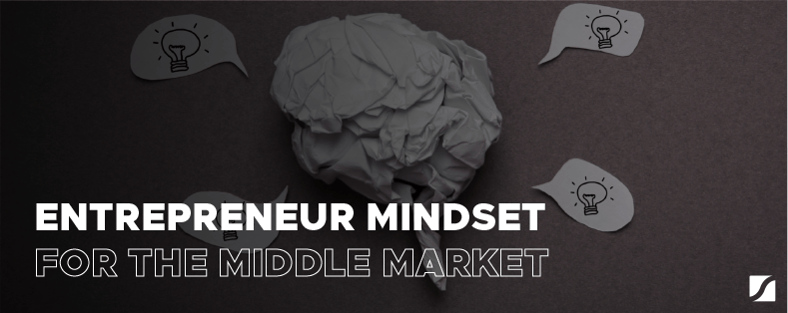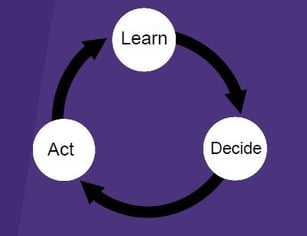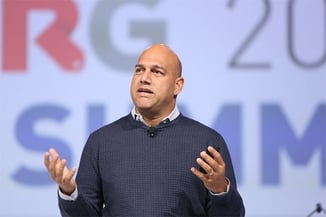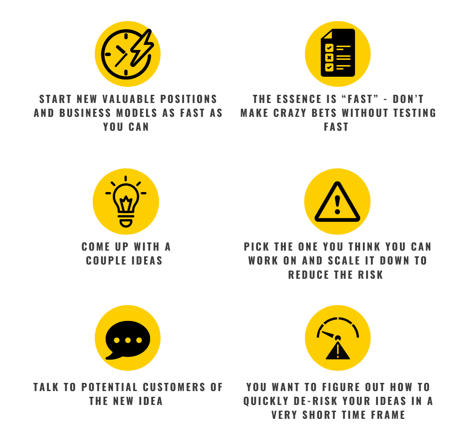How to Develop an Entrepreneurial Mindset to Become a Better Leader


As you grow a midsize company, it feels like you’re constantly struggling between two different priorities.
It takes structure and discipline to grow effectively without crashing into the ground. But you don’t want to lose the scrappy spirit that got you here in the first place.
It’s a tough balance to strike.
I found a way to manage this by embracing the mindset of an entrepreneur.
Yes, sustainable growth is important. But your ability to quickly adapt to opportunities is a powerful source of competitive advantage.
This mindset is essential for mid-market leaders, and it’s possible to develop it even when it feels like the demands of your business are pulling you in all directions.
What Is An Entrepreneurial Mindset?
Entrepreneurship has many definitions, but they all revolve around the activities (and risk) of starting, managing, and growing a business to drive value.
The entrepreneurial mindset is the specific set of values, beliefs, attitudes, and thought processes that drive those activities.
Why Should You Develop An Entrepreneurial Mindset?
For the most successful entrepreneurs, it’s mindset that helped them power through the unique challenges of scaling. It’s what enabled them to take risks, set the vision for growth, and see opportunities no one else could spot.
You see, as your own business grows, you and your leadership team will face more challenges brought on by the complexity of that growth.
You’ll need to rethink processes - or create them for the first time. You’ll need to adopt new tools and systems. You’ll need to hire more people. You’ll need access to knowledge that helps you better compete at a more competitive level. All of which will cost time, money, and energy. And that’s just internally.
If you want your business to thrive in the face of rapidly developing trends, technology, and people practices, the entrepreneurial mindset will serve you well.
If you want to adopt this mindset for yourself and your company, here are 5 actions you can take starting today.
5 Ways To Think Like An Entrepreneur In Your Leadership
1. Commit To Your Ongoing Growth and Development
My friend and mentor Verne Harnish has a saying:
“Whoever can learn quickest from the market, decides and then acts on it.” 
In other words, the right idea can just as easily save your team hours of wasted work as it can disrupt industries.
The most successful entrepreneurs embrace the mantra that they should never stop learning.
It doesn’t matter if you’re the CEO, department head, or senior coordinator. Investing in your ongoing growth is one of the most surefire ways to ensure you can evolve faster than your business and drive it to the next level.
Thanks to our digital-first world, committing to your learning is easier than ever before. You can find an online course, a YouTube video, or an in-depth article on virtually anything.
Here at Growth Institute, we offer our employees a learning stipend to invest in their professional development. Even more, all our courses are open for the team to take at any time they want. If someone on my team has a book they’ve had their eye on, we’ll order it on Amazon and send it to them.
Our attitude for learning better and faster is quite simple: You have to implement what you’ve learned.
If you learned how to improve a process, you try it out yourself. If you read about an exciting new marketing tactic, you share it with your team.
2. Develop A Growth Mindset
You could easily confuse a growth mindset with an entrepreneurial mindset because they're so similar.
But I believe it’s essential to understand how a growth mindset is different from its opposite - the fixed mindset. 
Leaders with a fixed mindset believe that basic traits like creativity, critical thinking, and emotional intelligence are inherent and can’t be changed or improved. This attitude tends to stifle growth in teams and entire companies. You can’t break past barriers if you can’t even imagine yourself doing it.
On the other hand, leaders with a growth mindset believe that talents and abilities can be developed through time and effort.
These leaders are more resilient, spot more opportunities, and - most importantly - don’t waste time and energy focusing on setbacks. Instead, they focus on solutions, processes, and growth - all qualities you will need to build a growing business effectively.
Some ways you can develop a growth mindset:
- Accept that rapid change is a fixture of our “new normal” and embrace the possibility of new ideas, new processes, and new paradigms.
- Better understand your strengths, limitations, and motivations, so you can do the work to improve and delegate where you see fit.
- Make it a habit to focus on progress rather than results and setbacks as you drive growth in your organization.
3. Embrace Experimentation And New Ideas
We take our definition of experimentation from best-selling author and former VP of Yahoo, Salim Ismail, who defines it as:  “The implementation of the Lean Startup methodology of testing assumptions and constantly experimenting with controlled risks.”
“The implementation of the Lean Startup methodology of testing assumptions and constantly experimenting with controlled risks.”
Experimentation (done right) helps you gain insights about your market in a fast and low-risk way.
Entrepreneurs work with few resources, cash, or knowledge power in many areas of business. This makes experimentation a powerful tool because it’s a rapid and reliable way to test product-market fit. It also works if you're a leader in a growing mid-sized company and you spot an opportunity to reduce complexity (there always are).
I recently learned of a more efficient approach to running experiments from entrepreneur and business consultant Alex Osterwalder.
He says that “you want to figure out how to quickly de-risk even your boldest ideas in a very short time frame.” 
The idea is that in today’s world, we have limited time to invest in experimentation. So your best approach is to brainstorm several ideas, pick the one that’s most feasible for you to work on, and then come up with a low-risk way to test it.
Then repeat as needed.
4. Define A Clear Vision For Yourself And Your Company
Entrepreneurs are goal-oriented. They have a vision for the future that others haven’t even dreamed of.
That’s why clear long-term goals are essential to the entrepreneurial mindset. When you have the foresight to create a North Star for your business, you empower yourself and the team to bounce back from all the challenges you’ll encounter along the way and quickly refocus.
Take the time to create (or reflect on) your own and your company’s long-term goals.
What is your Big, Hairy, Audacious Goal and strategy for achieving it?
What are your strategic goals for this year?
What is the massive transformative purpose for which your company exists?
Work through these questions. Write them down. Share them with your team and your company.
5. Develop Your Strategic Thinking Brain
Even for the decisive, creative, rulebook-out-the-window entrepreneurial leader, strategy matters.
We’ve established that entrepreneurial leaders are goal-oriented and have a strong bias for action. But what’s just as important in your toolkit is understanding what to do and what not to do.
As Steve Jobs said about growing Apple:
“You have to pick carefully. I’m actually as proud of the things we haven’t done as the things I have done. Innovation is saying no to 1,000 things.”
If you and your business can’t make clear and consistent decisions about how you serve your customers and how you grow, your competition will step in to fill that void.
That’s why it’s not enough to just have a strategy in place. You must develop your ability to think and execute like a top strategist.
There’s a 5-step process (developed by a master strategist and former McKinsey consultant) that you can replicate to develop your own strategic thinking.
Here is the process scaled down. You can run through this exercise using a notepad:
- Imagine the future of your organization that you want to work toward
- Dissect your business model and consider all the ways in which you differentiate yourself
- Expand your strategic options by generating all the strategic ideas for your organization that you can think of
- Choose your best options and don’t be afraid to choose the “crazy” ideas
- Finally, build a plan to sell your strategy to your team
Think and Scale Like An Entrepreneur
The road to scaling a successful business is a long one. Along the way you’ll face tough decisions, endless drama, moments of panic, and the burden of knowing that it all rests on you.
Make the journey easier on yourself.
An entrepreneurial mindset won’t solve these challenges for you. But it will give you the tools you need to overcome them with resilience, creativity, and just a little bit of extra luck.



.png)
